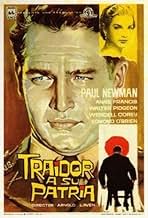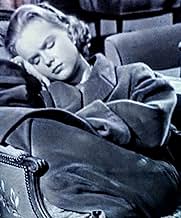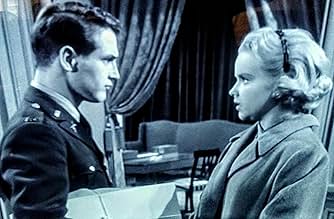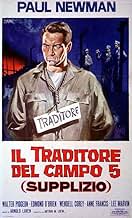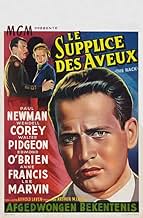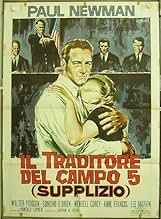Um herói de guerra coreano colabora inexplicavelmente com o inimigo enquanto estava em um campo de prisioneiros de guerra e é submetido a uma corte marcial.Um herói de guerra coreano colabora inexplicavelmente com o inimigo enquanto estava em um campo de prisioneiros de guerra e é submetido a uma corte marcial.Um herói de guerra coreano colabora inexplicavelmente com o inimigo enquanto estava em um campo de prisioneiros de guerra e é submetido a uma corte marcial.
- Direção
- Roteiristas
- Artistas
- Law Officer
- (as Robert Simon)
- Courtroom Spectator
- (não creditado)
- Skinny
- (não creditado)
- Student
- (não creditado)
- Family Member
- (não creditado)
- Direção
- Roteiristas
- Elenco e equipe completos
- Produção, bilheteria e muito mais no IMDbPro
Avaliações em destaque
Among films based on courtroom trials this one is remarkable. It rates alongside Bruce Beresford's Australian film "Breaker Morant" and the British film "Term of Trial."
A major feather in the cap is the ending, which is a clever touch by the director Arnold Laven. Any other ending would have made the film less poignant.
The development of the relationship between Newman's character and that of Annie Francis' Aggie is again worthy of note. Lee Marvin's small role catches your attention though it is not his finest by any measure.
All in all this film should be given more publicity, as the theme is relevant today as it was when it was made.
Making things triply worse is the fact that Newman comes from a military family. His father Walter Pidgeon is in the service, his brother was killed in Korea, and the brother's wife Anne Francis has stayed with Pidgeon. It was after a welcome home party for Newman that Pidgeon receives the word about Newman's court martial. Walter Pidgeon gives the best performance in the film, his scenes with Newman after he gets the news are what great acting is all about.
Prosecuting Newman is Wendell Corey and his defense counsel is Edmond O'Brien a good pair of cinematic legal adversaries if there ever was one. Also in the film is Lee Marvin who was a fellow prisoner and who is the original accusatory witness against Newman. Marvin's scene in the witness stand is also classic.
The Pacific Theater of World War II and later the Korean War put us against enemies of an oriental culture and the second one flavored with Marxism. Their view of prisoners was one radically different from the western one. Someone who didn't die at his duty and allowed himself to be captured was one worthy of contempt. It's why the atrocities that happened and more important the fact that the prison keepers never viewed what they did as atrocities. These were all new issues for the American public to face. It would come even closer to home during the Vietnam War.
The Rack is the story of one man who reached a breaking point while in captivity. Those points are not the same with every individual. That fact is brought out quite clearly in this fine film.
*** (out of 4)
Paul Newman, in his third film, plays Korean War vet who was a POW for three years. When he returns home he's brought up on treason charges and faces a court marshall. This film is based on a Rod Serling teleplay so the material makes for a good movie, although in the end I'm not sure what type of message it's sending out. The POW was tortured, not physically but mentally, and the film takes a look at this and what one's breaking point is. A lot of questions about loyalty to your country is brought up during the court scenes but some might be confused by what the ending tries to say or the complete turn around that seems to happen half way through the film. There's also the added plot of Newman's character not being able to connect with his hard boiled father (Walter Pidgeon) and connecting to his dead brother's girlfriend (Ann Francis). The film's screenplay has a lot of great sequences in it but it never really becomes clear on what it's trying to say. Is the film trying to claim that everyone has a breaking point? Is it trying to say that everyone should reach a breaking point but keep going for your country? The film seems to want to have its cake and eat it too as both sides are given credit yet neither takes the stage over the other. What works the best here are the performances with Newman stealing the film with his passionate character. The torture Newman displays is very striking and wonderfully done, which is rather amazing considering this was only his third film. Pidgeon has some equally impressive scenes as does Cloris Leachman. Lee Marvin, playing a tortured vet, also comes across very good in his few scenes. Wendell Corey and Edmond O'Brien are also very good. While the film's message might be someone confusing the film still works as a nice drama with plenty of good performances.
Theres a scene where Paul Newman confronts his son. It brought to mind, an experience that brings home the costs of war. 1966, I had complete my combat medic training, and was waiting for my next class, pharmacology and compounding meds.
I was loaned out to the burn center, at Brook. Army medical center, Ft Sam Houston, San Antonio, Texas.
Daily planes would arrive bringing young men, pilots whose planes had crashed, soldiers, marines who were engulfed in napalm, a jellied gasoline. And by far the worst, white phosphorous grenades, with faulty fuses that at times exploded as it left the throwers hand.
What was left looked more like 150 pounds of clay, then a human. All facial features, arms, hands vaporized.
I know how dreadful this sounds....but its the reality combat soldiers face, that I believe makes them more vulnerable to coercion.
I'm 74, and if I live to 174 I'll never forget the young wives, 19-24, thrilled to finally see their husbands, only to stare wide eyed, mouthing the right words, and only when they left the room....would they drop to the ground sobbing. The reality that a part of their psyche was just as horribly disfigured.
Yes, see this movie. Know, none of the gore is in the movie, but offered to help explain the movie. One other movie you must see is, "Johnny got his gun" directed by Dalton Trumbo.
Wars aren't just pork. Not a way to pay back, the folks in your district for getting you elected. They are dirty rotten nightmares, in which our sons and daughters will be ground into hamburger. Rember how gay the mood was as the south, sent their boys off for a 2 week war. Remember the depth of their disillusion?
Fight if we must. Only if we must.
Você sabia?
- CuriosidadesRod Serling took 19 months to complete the teleplay, the longest he ever spent writing a single screenplay. It also took seven re-writes to get to the final version, the most of any of his screenplays.
- Erros de gravaçãoIn the closing scene inside the courtroom, Capt. Miller (Lee Marvin) conspicuously comes in and sits down in a chair right next to the door, against the back wall. We see him there in a couple of close-up shots, but in several wide camera shots taken from the front of the courtroom, he is nowhere to be seen.
- Citações
Lt. Col. Frank Wasnick: [Addressing the jury, presenting the closing arguments for Capt. Hall's defense] Gentlemen, I have here a document which is not very pleasant to read. It's a communiqué written by the Communists describing shortcomings they observed among certain American prisoners of war.
Lt. Col. Frank Wasnick: [Quoting from the document] "One: Many of the prisoners reveal weak loyalties to their families, their communities, and their army. Two: When left alone, they tend to feel deserted, and they underestimate their ability to survive, because they underestimate themselves."
Lt. Col. Frank Wasnick: Now, the report goes on to say that even some of our university graduates have a very dim idea of American history and of the strengths and weaknesses of American democracy and that they are virtually ignorant of Communism, because we have never taken the trouble to inform them of its nature. The Communist program of indoctrination was based on this appraisal - and succeeded, because in many cases, the appraisal was true... And now we must judge Capt. Hall. Gentlemen, if there is guilt, where does it lie? In that small number who defected under pressure, as Capt. Hall did? Or do we not share it? At least those of us who created *part* of a generation which may collapse, because we have left it uninspired, uninformed, and - as in the case of Capt. Hall - unprepared to go the limit, because he had not been given the warmth to support him along the way... And now we must judge Capt. Hall. And let us make absolutely certain, that we have had no part in his collapse. This man has proven himself in the two wars of his youth, who has been exposed to conditions of captivity, against which we have never had to test ourselves.
- Versões alternativasExists in a computer-colorized version.
- ConexõesReferenced in American Masters: Rod Serling: Submitted for Your Approval (1995)
Principais escolhas
- How long is The Rack?Fornecido pela Alexa
Detalhes
- Data de lançamento
- País de origem
- Idioma
- Também conhecido como
- The Rack
- Locações de filme
- Letterman Army Hospital, Presidio, Golden Gate National Recreation Area, San Francisco, Califórnia, EUA(exterior scenes at the army hospital)
- Empresa de produção
- Consulte mais créditos da empresa na IMDbPro
Bilheteria
- Orçamento
- US$ 779.000 (estimativa)
- Tempo de duração1 hora 40 minutos
- Cor
- Proporção
- 1.85 : 1
Contribua para esta página


